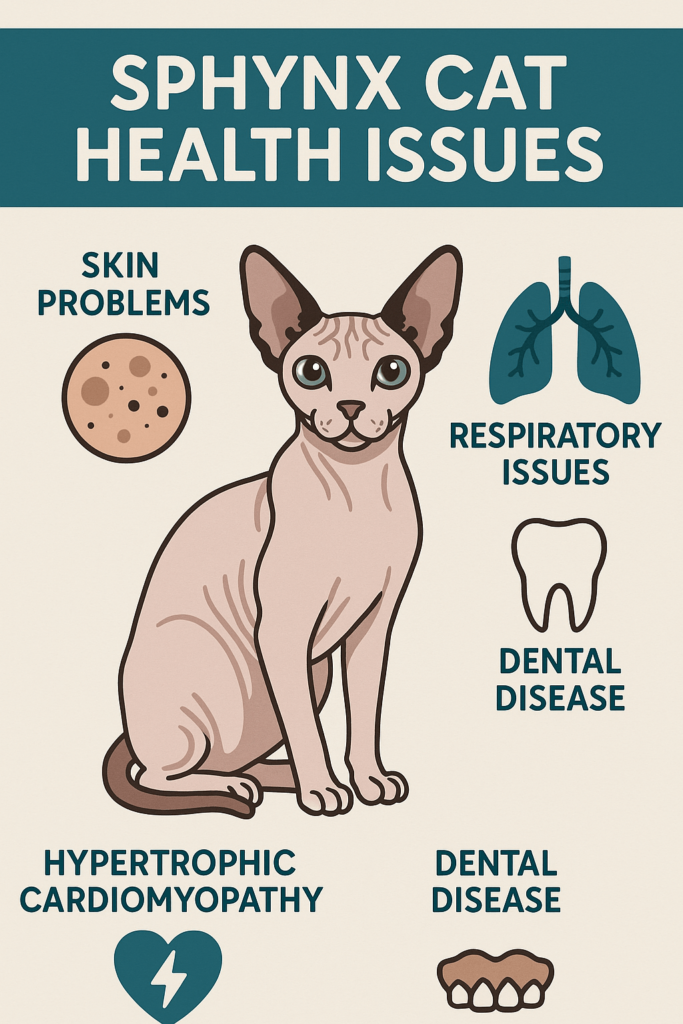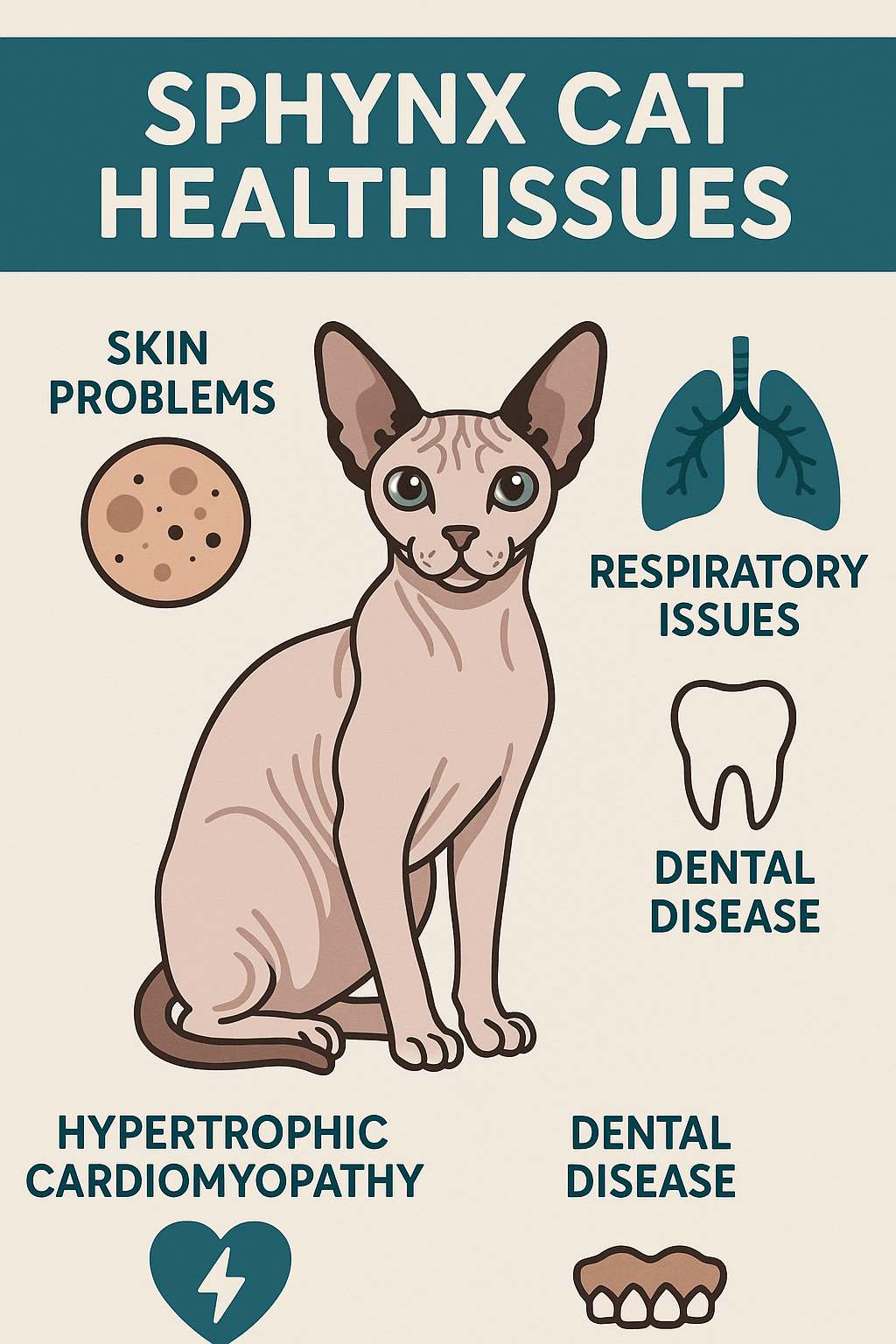Sphynx Cat Health Issues: What Every Owner Should Know
The Sphynx cat, with its striking appearance and playful personality, has captured the hearts of cat lovers worldwide. Known for their hairless bodies and wrinkled skin, these feline companions are as unique as they are charming. However, owning a Sphynx comes with specific responsibilities, particularly when it comes to their health. Due to their lack of fur and unique genetic traits, Sphynx cats are prone to certain health issues that require proactive care. Understanding these potential concerns is essential for ensuring your Sphynx lives a long, happy, and healthy life. Let’s explore the most common health issues faced by Sphynx cats and how you can address them effectively.
Expert Insight: Sphynx Cat Health
“As a cat with uncommon features, a Sphynx can be affected by genetic conditions as well as secondary infections. Working with a reputable breeder who screens their cats’ health can help ensure your Sphynx has a long and healthy life.”
Common Health Issues in Sphynx Cats
Sphynx cats are generally robust and energetic, but their distinctive traits make them susceptible to specific health problems. Awareness of these conditions allows owners to take preventive measures and seek timely veterinary care.
Hypertrophic Cardiomyopathy (HCM):
This heart condition causes the walls of the heart to thicken, leading to reduced blood flow. Regular cardiac screenings can help detect HCM early.Skin Conditions:
Without fur, Sphynx cats are prone to skin issues such as rashes, infections, and oil buildup. Frequent bathing and skincare routines are crucial.Dental Problems:
Sphynx cats often suffer from periodontal disease due to their unique jaw structure. Regular dental cleanings and at-home care can prevent complications.Respiratory Issues:
Their lack of fur makes them more vulnerable to colds and respiratory infections, especially in cooler climates. Keeping them warm is vital for their well-being.Gastrointestinal Sensitivities:
Some Sphynx cats have sensitive stomachs, making them prone to vomiting or diarrhea. A balanced diet tailored to their needs is essential.
By addressing these common health concerns proactively, you can ensure your Sphynx remains healthy and vibrant throughout their life.

Preventive Care Tips for Sphynx Cats
Prevention is key to managing the unique health challenges faced by Sphynx cats. With proper care, many potential issues can be minimized or avoided altogether.
Regular Vet Check-Ups:
Schedule annual or biannual veterinary visits to monitor your Sphynx’s overall health and catch any issues early.Skincare Routine:
Bathe your Sphynx every 1-2 weeks using a gentle, hypoallergenic shampoo to remove excess oil and prevent skin irritation.Temperature Regulation:
Keep your home warm and provide cozy blankets or sweaters to protect your Sphynx from cold temperatures.Balanced Nutrition:
Feed your cat high-quality, protein-rich food to support their metabolism and reduce the risk of gastrointestinal problems.Dental Hygiene:
Brush your Sphynx’s teeth regularly and provide dental treats or toys to maintain oral health and prevent plaque buildup.
Implementing these preventive measures can significantly improve your Sphynx’s quality of life and reduce the likelihood of health issues.
Check this guide 👉Maine Coon Sphynx Mix: Best 7 Expert Tips!
Check this guide 👉Understanding the Sphynx Cat Lifespan: Best 7 Expert Tips!
Check this guide 👉Are Sphynx Cats Hypoallergenic? Best 7 Health Tips!
Health Concerns in Sphynx Cats | Preventive Measures |
|---|---|
Hypertrophic Cardiomyopathy (HCM) | Regular cardiac screenings |
Skin Rashes and Infections | Weekly baths and moisturizing |
Dental Disease | Daily teeth brushing and vet cleanings |
Cold Sensitivity | Providing warmth and cozy bedding |
Gastrointestinal Issues | Feeding a high-quality, balanced diet |
Signs of Health Problems in Sphynx Cats
Early detection of health issues is critical for ensuring your Sphynx receives prompt treatment. Be vigilant about observing changes in their behavior or physical condition.
Excessive Scratching or Licking:
Persistent scratching may indicate skin irritation or allergies. Consult your vet to identify the underlying cause.Labored Breathing or Coughing:
Difficulty breathing could signal respiratory issues or heart problems. Immediate veterinary attention is necessary.Weight Loss or Appetite Changes:
Sudden weight loss or refusal to eat may point to gastrointestinal or systemic health issues.Lethargy or Weakness:
If your normally active Sphynx seems unusually tired or uninterested, it could indicate an underlying illness.Bad Breath or Swollen Gums:
These symptoms often point to dental disease and should not be ignored.
Recognizing these signs early allows you to address potential problems before they escalate into serious health concerns.
How to Support Your Sphynx Cat’s Overall Health
Beyond addressing specific health issues, there are general practices that promote your Sphynx’s overall well-being. These tips can help your cat thrive and stay happy.
Provide Mental Stimulation:
Engage your Sphynx with interactive toys and puzzles to keep their curious minds active and entertained.Maintain a Clean Environment:
Regularly clean their bedding, litter box, and living space to minimize exposure to allergens and bacteria.Monitor Sun Exposure:
While Sphynx cats love warmth, direct sunlight can damage their sensitive skin. Use sunscreen or limit sun exposure.Encourage Exercise:
Playtime helps maintain a healthy weight and supports cardiovascular health. Aim for at least 15-20 minutes daily.Stay Informed:
Educate yourself about breed-specific health risks and advancements in cat care to make informed decisions about your pet’s health.
By incorporating these practices into your routine, you can create a nurturing environment that supports your Sphynx’s unique needs.
Genetic Factors Contributing to Sphynx Health Issues
The Sphynx breed’s unique characteristics stem from specific genetic traits, which can also predispose them to certain health issues. Understanding these genetic factors helps owners anticipate and manage potential problems.
Hairlessness Gene:
The gene responsible for their lack of fur also affects skin oil production, leading to oily skin and related issues.Heart Disease Predisposition:
Certain genetic markers increase the risk of hypertrophic cardiomyopathy in Sphynx cats.Temperature Sensitivity:
Their hairlessness makes them more vulnerable to temperature extremes, requiring careful climate control.Skin Sensitivity:
The absence of fur exposes their skin to irritants, increasing the likelihood of rashes or infections.Metabolic Rate:
Sphynx cats have a higher metabolism, making them prone to weight loss if not fed appropriately.
Understanding these genetic predispositions allows owners to tailor care plans to their Sphynx’s specific needs.
Managing Allergies in Sphynx Cats
Allergies are a common concern for Sphynx cats due to their exposed skin and heightened sensitivity. Identifying triggers and managing symptoms is essential for their comfort.
Food Allergies:
Symptoms like itching or digestive upset may indicate a food allergy. Work with your vet to identify problematic ingredients.Environmental Allergens:
Dust, pollen, and cleaning products can irritate their skin. Use hypoallergenic cleaning supplies and vacuum frequently.Flea Allergy Dermatitis:
Even a single flea bite can cause severe reactions. Use veterinarian-recommended flea prevention methods.Contact Dermatitis:
Certain fabrics or materials may irritate their skin. Opt for soft, hypoallergenic bedding and clothing.Seasonal Changes:
Monitor your cat during seasonal shifts, as temperature and humidity changes can exacerbate allergies.
Proactive allergy management ensures your Sphynx stays comfortable and free from irritation.
Building a Strong Bond Through Health Care
Taking care of your Sphynx’s health not only keeps them physically fit but also strengthens your bond. Incorporating care routines into your daily interactions fosters trust and companionship.
Bathing Together:
Make bath time a bonding session by speaking softly and rewarding your cat with treats afterward.Playful Exercise:
Engaging in active play builds trust while keeping your Sphynx physically healthy.Grooming Sessions:
Regular grooming allows you to check for skin issues while reinforcing your connection through gentle touch.Routine Vet Visits:
Accompanying your cat to vet appointments shows them you’re committed to their well-being.Positive Reinforcement:
Reward calm behavior during care routines to create positive associations and reduce stress.
Through attentive care and affection, you’ll deepen your bond with your Sphynx while ensuring their health and happiness.
Frequently Asked Questions About Sphynx Cat Health Issues
Are Sphynx cats more prone to health problems than other breeds?
While Sphynx cats are generally healthy, their unique traits make them more susceptible to specific issues like skin and heart conditions.
How often should I bathe my Sphynx cat?
Bathing your Sphynx every 1-2 weeks is recommended to prevent oil buildup and skin irritation.
What should I feed my Sphynx cat?
A high-protein, grain-free diet tailored to their metabolic needs is ideal for maintaining optimal health.
Can Sphynx cats go outside?
It’s best to keep Sphynx cats indoors to protect their sensitive skin from harsh weather and potential injuries.
How can I tell if my Sphynx is overheating or too cold?
Signs of overheating include panting and lethargy, while shivering or seeking warmth indicates they’re too cold.
Caring for Your Unique Sphynx Companion
Owning a Sphynx cat is a rewarding experience, but it comes with unique responsibilities. By understanding their specific health needs and implementing preventive care strategies, you can ensure your feline friend enjoys a long, healthy life. From regular vet visits to attentive skincare routines, every step you take contributes to their well-being. Remember, the bond you share with your Sphynx is built on trust, care, and love—qualities that will guide you in providing the best possible life for your extraordinary companion.
Dog Tapeworm Life Cycle: Best 7 Expert Tips! – Learn how tapeworms infect dogs, spot symptoms, and break the cycle with expert prevention strategies.
Anxious Cat Body Language: Best 7 Expert Tips! – Learn to spot signs of stress, understand triggers, and help your cat feel safe and relaxed.
Anxious Dog Body Language: Best 7 Expert Tips! – Learn to spot signs of anxiety, respond effectively, and help your dog feel safe and secure.
Is Breeding Dogs Bad? Best 7 Expert Tips! – Explore the ethics, benefits, and risks of dog breeding to make informed decisions for a better future.





